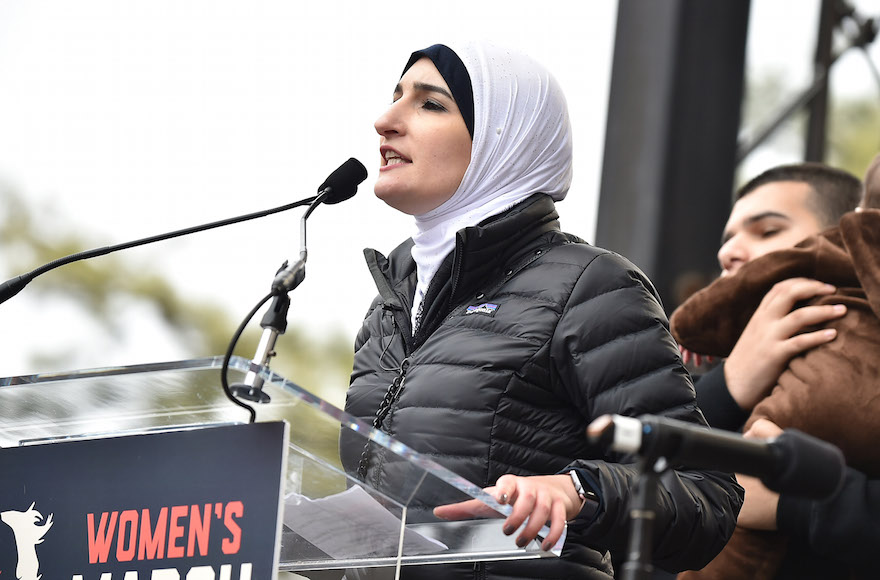(JTA) — Liberal American Jews, many of whom are involved in causes for gender and racial justice, have recently found themselves alienated by those movements’ stances on Israel.
That conflict was seen last year when a platform associated with the Black Lives Matter movement accused Israel of committing “genocide” against the Palestinians and called it an “apartheid state.” The platform drew ire from Jewish groups who had previously expressed support for BLM’s goals of racial justice.
Now the same conflict is playing out with feminist groups whose cause has gained steam since the election of President Donald Trump. A platform for the U.S. affiliate of the International Women’s Strike — a grassroots feminist movement that organized events around the world last Wednesday — calls “for the decolonization of Palestine.”
Responding Monday to critics of the Palestine plank in a platform devoted to women’s rights, Palestinian-American activist Linda Sarsour, an organizer of January’s Women’s March on Washington who also helped plan the Women’s Strike, came forth with a harsh message: feminism and Zionism simply don’t go together.
In an interview with The Nation, Sarsour said those who identify as Zionist cannot be feminist because they are ignoring the rights of Palestinian women.
“It just doesn’t make any sense for someone to say, ‘Is there room for people who support the state of Israel and do not criticize it in the movement?’ There can’t be in feminism. You either stand up for the rights of all women, including Palestinians, or none. There’s just no way around it,” Sarsour said.
Sarsour also said that Palestinian-American women in social justice movements cannot be as visible as other women because they are the target of unspecified attacks from “right-wing Zionists.”
“The fact of the matter is that there are hundreds of Palestinian women organizing, but not all of them are visible. And I’ll tell you why,” Sarsour said. “You’ve probably seen that any visible Palestinian-American woman who is at the forefront of any social-justice movement is an immediate target of the right wing and right-wing Zionists. They will go to any extreme to criminalize us and to engage in alternative facts, to sew together a narrative that does not exist.”
Sarsour was responding directly to criticism of the platform’s statement on Israel by Emily Shire, the politics editor of the women’s news site Bustle. Shire wrote about her dilemma as a Zionist feminist in a New York Times op-ed published March 7.
“I find it troubling that embracing such a view is considered an essential part of an event that is supposed to unite feminists,” she wrote. “I am happy to debate Middle East politics or listen to critiques of Israeli policies. But why should criticism of Israel be key to feminism in 2017?”
Shire also criticized the strike for the involvement of Rasmea Odeh, a Palestinian woman convicted and sentenced by an Israeli military court in 1970 to life in prison for her role in two bombing attacks, including one in 1969 that killed two Israelis. Odeh was among the eight authors of an op-ed in The Guardian announcing the movement. She confessed to planting the bomb, though in recent years has claimed that the confession was given under torture, which is disputed by Israeli officials.
“While the fairness of Ms. Odeh’s conviction is debated, the fact that she was a member of the Popular Front for the Liberation of Palestine, which was categorized as a terrorist organization by the State Department, is not,” Shire wrote.
Sarsour was in the Jewish media spotlight last month for quite different reasons. Following the vandalism of a Jewish cemetery outside St. Louis, she and another Muslim activist, Tarek El-Messidi, organized a fundraiser for the repair of the burial site. They managed to raise over $160,000, far exceeding their $20,000 goal.
JTA has documented Jewish history in real-time for over a century. Keep our journalism strong by joining us in supporting independent, award-winning reporting.






